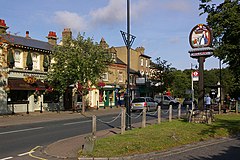Chislehurst
| Chislehurst | |
|---|---|
 Chislehurst village sign |
|
| Chislehurst shown within Greater London | |
| Population | 14,831 (2011. Ward) |
| OS grid reference | TQ445705 |
| London borough | |
| Ceremonial county | Greater London |
| Region | |
| Country | England |
| Sovereign state | United Kingdom |
| Post town | CHISLEHURST |
| Postcode district | BR7 |
| Dialling code | 020 |
| Police | Metropolitan |
| Fire | London |
| Ambulance | London |
| EU Parliament | London |
| UK Parliament | |
| London Assembly | |
Chislehurst (/ˈtʃɪzəlˈhɜːrst/) is an affluent suburban district in south east London, England and a part of the London Borough of Bromley. It borders the London Boroughs of Bexley and Greenwich, and lies east of Bromley and south west of Sidcup. It is 10.5 miles (16.9 km) south east of Charing Cross.
The name "Chislehurst" is derived from the Saxon words cisel 'gravel', and hyrst 'wooded hill'.
Camden Place (now Chislehurst Golf Club, 51° 24′ 40.05″N 0° 3′ 55.69″E ) takes its name from the antiquary William Camden, who lived in the former house on the site from c.1609 until his death in 1623. The present house was built shortly before 1717, and was given a number of additions in the late 18th and very early 19th centuries by the architect George Dance the younger. In about 1760, the house and estate were bought by Charles Pratt, the Attorney General, and later Lord Chancellor. Pratt was ennobled in 1765, taking the title Baron Camden, of Camden Place: in 1786 he was created Earl Camden. A later occupant of the house, from 1871 until his death there in 1873, was the exiled French Emperor, Napoleon III. His body and that of the Prince Imperial were originally buried in St Mary's Church, before being removed to St Michael's Abbey, Farnborough. The Emperor's widow, the Empress Eugénie, remained at Camden Place until 1885. There is a memorial to Napoléon Eugène on Chislehurst Common, and the area's connections with the imperial family are found in many road names and in the local telephone code, 467, which in its earlier format corresponded to the letters IMP (for imperial).
...
Wikipedia

